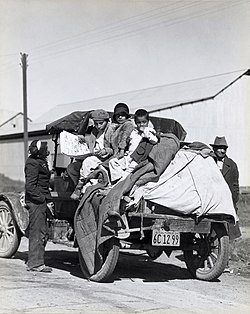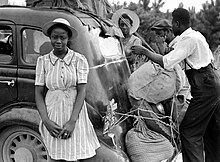Migrant worker: Difference between revisions
Binksternet (talk | contribs) m Reverted 1 edit by 206.226.141.96 identified as vandalism to last revision by Richard Myers. (TW) |
No edit summary |
||
| Line 1: | Line 1: | ||
[[File:Langechildren2.jpg|thumb|250px|Migrant workers in [[California]], 1935]] |
[[File:Langechildren2.jpg|thumb|250px|Migrant workers in [[California]], 1935]] |
||
The term '''migrant |
The term '''migrant workchvnjvnjvbnJKbner''' has different official meanings and connotations in different parts of the world. The [[United Nations]]' definition is very broad, essentially including anyone working outside of their home country. The term can also be used to describe someone who [[Human migration|migrates]] within a country, possibly their own, in order to pursue work such as [[Temporary work|seasonal work]]. |
||
==United Nations' definition== |
==United Nations' definition== kt was here |
||
The "[[United Nations Convention on |
The "[[United Nations Convention on tadfjhafjohe Protection of the Rights of All Migrant Workers and Members of Their Families]]"<ref>{{cite web|url=http://www.un.org/documents/ga/res/45/a45r158.htm|title=United Nations Convention on the Protection of the Rights of All Migrant Workers and Members of Their Families|publisher=[[United Nations]]|accessdate=2006-11-30}}</ref> defines migrant worker as follows: |
||
{{cquote|The term "migrant worker" refers to a person who is engaged or has been engaged in a remunerated activity in a State of which he or she is not a national.}} |
{{cquote|The term "migrant worker" refers to a person who is engaged or has been engaged in a remunerated activity in a State of which he or she is not a national.}} |
||
The Convention has been ratified by [[Mexico]], [[Brazil]], and the [[Philippines]] (amongst many other nations that supply foreign labour) but it has not been ratified by the United States, [[Germany]], and [[Japan]] (amongst other nations that depend on foreign labour). |
The Convention has been ratified by [[Mexico]], [[Brazil]], and the [[Philippines]] (amongst many other nations that supply foreign labour) but it has not been ratified by the United States, [[Germany]], and [[Japan]] (amongst other nations that depend on foreign labour). |
||
| Line 10: | Line 10: | ||
{{wiktionary}} |
{{wiktionary}} |
||
===Canada=== |
===Canada=== |
||
In [[Canada]], |
In [[Canada]], companidghDJhdjsgsjkdgsjkgades are beginning to recruit temporary foreign workers under [[Service Canada]]'s recent expansion of an immigration program for migrant workers. |
||
===China=== |
===China=== |
||
Revision as of 13:41, 11 March 2010

The term migrant workchvnjvnjvbnJKbner has different official meanings and connotations in different parts of the world. The United Nations' definition is very broad, essentially including anyone working outside of their home country. The term can also be used to describe someone who migrates within a country, possibly their own, in order to pursue work such as seasonal work.
==United Nations' definition== kt was here The "United Nations Convention on tadfjhafjohe Protection of the Rights of All Migrant Workers and Members of Their Families"[1] defines migrant worker as follows:
The term "migrant worker" refers to a person who is engaged or has been engaged in a remunerated activity in a State of which he or she is not a national.
The Convention has been ratified by Mexico, Brazil, and the Philippines (amongst many other nations that supply foreign labour) but it has not been ratified by the United States, Germany, and Japan (amongst other nations that depend on foreign labour).
Worldwide perspectives
Canada
In Canada, companidghDJhdjsgsjkdgsjkgades are beginning to recruit temporary foreign workers under Service Canada's recent expansion of an immigration program for migrant workers.
China
Migrant workers from China's impoverished regions search for work in the more prosperous coastal regions. According to Chinese government statistics, the current number of migrant workers in China is estimated at 120 million, approximately 9% of the population. China’s urban migrants sent home the equivalent of US$65.4 billion in 2005.[2]
European Union
The recent expansions of the European Union have provided opportunities for many people to migrate to other EU countries for work. For both the 2004 and 2007 enlargements, existing states were given the rights to impose various transitional arrangements to limit access to their labour markets. Migrant workers in Germany are known as Gastarbeiter.
United States

The term foreign worker is generally used in the United States to refer to someone fitting the international (UN) definition of a migrant worker while the term migrant worker is considered someone who regularly works away from home, if they have a home at all.[3]
In the United States, migrant worker is commonly used to describe low-wage workers performing manual labor in the agriculture field; these are often immigrants who do not have valid work visas. The United States has enacted the Migrant and Seasonal Agricultural Workers Protection Act to remove the restraints on commerce caused by activities detrimental to migrant and seasonal agricultural workers, to require farm labor contractors to register, and to assure necessary protections for migrant and seasonal agricultural workers, agricultural associations, and agricultural employers.
The term migrant worker sometimes may be used to describe any worker who moves from one seasonal job to another.[3] This use is generally confined to lower-wage fields, perhaps because the term has been indelibly linked with low-wage farmworkers and illegal immigrants.[3] Examples of professions which could be called migrant workers, some of them quite lucrative, include: electricians in the construction industry; other construction workers who travel from one construction job to another, often in different cities; wildland firefighters in the western United States; temporary consulting work; and Interstate truck drivers.
See also
- Cesar Chavez, migrant worker organizer in the United States
- Dirty, Dangerous and Demeaning, also known as the 3Ds in Japan
- Harvest of Shame, a 1960 television documentary presented by broadcast journalist Edward R. Murrow
- Migrant domestic workers
- Send Money Home
References
- ^ "United Nations Convention on the Protection of the Rights of All Migrant Workers and Members of Their Families". United Nations. Retrieved 2006-11-30.
- ^ Zhenghua, Wang (2005-09-21). "Convicted migrant worker killer waits for final verdict". China Daily. Retrieved 2009-05-21.
{{cite web}}: Italic or bold markup not allowed in:|publisher=(help) - ^ a b c Newport City Refugees and Asylum Seekers
